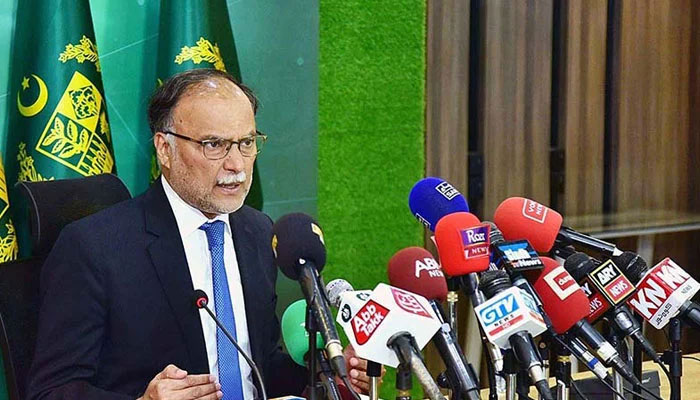Existing global system becoming increasingly irrelevant: Ahsan
Islamabad : Ahsan Iqbal, Federal Minister for Planning, Development and Special Initiatives has said that the existing post-World War-II global system became increasingly irrelevant particularly its financial and multilateral structures, which fail to address the economic challenges of developing nations.
Mr Ahsan was addressing as chief guest the closing session of Islamabad Conclave on the theme “Pakistan and the evolving global order” organised here by Institute of Strategic Studies (ISS).
Mr Ahsan highlighted that Pakistan’s geostrategic location at the crossroads of South Asia, Central Asia, and the Middle East offers unparalleled opportunities for regional trade, energy and connectivity. He cited the China-Pakistan Economic Corridor as a key enabler in this transformation, having already delivered critical infrastructure projects including 8,000 MW of energy and over 500 kilometres of highways. These developments position Pakistan as a pivotal hub for regional integration, trade and economic collaboration.
The minister outlined five strategic priorities for Pakistan to secure its place in the evolving global order. First, economic strength is fundamental to national resilience. Structural reforms, investment in human capital, and regional trade must be prioritised to reduce reliance on external aid and foster innovation-led growth. Second, the nation must embrace technological advancements to remain competitive globally. Initiatives like the National AI Policy and investments in emerging technologies including cybersecurity and green energy will be critical. Third, Pakistan must reclaim its leadership in the Organisation of Islamic Cooperation (OIC), championing issues such as Palestine and Kashmir while fostering collective economic growth among Muslim nations. Fourth, regional cooperation with neighbours such as India Iran, and Afghanistan are vital for stability and prosperity. Expanding initiatives like CPEC to include Afghanistan and Central Asia can promote peace and economic integration. Finally, domestic unity remains the cornerstone of an effective foreign policy.
He said building bridges across ethnic, religious, and regional divides will ensure internal cohesion and a stronger international presence. He concluded by emphasising that Pakistan’s future lies in economic diplomacy, innovation and proactive policies that leverage its geostrategic strengths, ensuring its rightful place in a dynamic global landscape. emphasising the need for revitalised UN-centered multilateralism to address global crises.
Hina Rabbani Khar, Chairperson, NA Standing Committee on Foreign Affairs, in her keynote address said that the world is transforming and people are fighting for primacy to rule the world. The conflict in the Middle East has exposed the major powers. She further said that South Asia suffered due to a lack of good bilateral relationships.
The People’s Party leader said that Pakistan is centrally located in South Asia and collectively the region did not perform well in addressing the challenges. Countries that do not learn from their mistakes are continuously suffering and history and geography are two constants that cannot be changed, she concluded.
Dr Moonis Ahmar from University of Karachi stated that while the world moved from a unipolar to a multipolar world, growing Sino-Russian engagement was increasingly important. Major regional fault lines lie in the Indo-Pak unresolved conflicts. Unless there was betterment of Indo-Pak relations, peace and stability will remain elusive, he said.
Earlier, Amina Khan, Director, ISS, in her welcome remarks stated that the regional strategic landscape fundamentally reshaped by great power competition, events in neighbouring Afghanistan as well as regional connectivity in South and Central Asia. She further said that these developments prompted Pakistan to reevaluate its diplomatic strategies and find ways to navigate its national interests while maintaining its regional influence.
-
 Ghost's Tobias Forge Makes Big Announcement After Concluding 'Skeletour World' Tour
Ghost's Tobias Forge Makes Big Announcement After Concluding 'Skeletour World' Tour -
 Katherine Short Became Vocal ‘mental Illness’ Advocate Years Before Death
Katherine Short Became Vocal ‘mental Illness’ Advocate Years Before Death -
 SK Hynix Unveils $15 Billion Semiconductor Facility Investment Plan In South Korea
SK Hynix Unveils $15 Billion Semiconductor Facility Investment Plan In South Korea -
 Buckingham Palace Shares Major Update After Meghan Markle, Harry Arrived In Jordan
Buckingham Palace Shares Major Update After Meghan Markle, Harry Arrived In Jordan -
 Demi Lovato Claims Fans Make Mental Health Struggle Easier
Demi Lovato Claims Fans Make Mental Health Struggle Easier -
 King Hospitalized In Spain, Royal Family Confirms
King Hospitalized In Spain, Royal Family Confirms -
 Japan Launches AI Robot Monk To Offer Spiritual Guidance
Japan Launches AI Robot Monk To Offer Spiritual Guidance -
 Japan Plans Missile Deployment Near Taiwan By 2031 Amid Growing Regional Tensions
Japan Plans Missile Deployment Near Taiwan By 2031 Amid Growing Regional Tensions -
 Meghan Markle, Prince Harry Spark Reactions With Latest Announcement
Meghan Markle, Prince Harry Spark Reactions With Latest Announcement -
 Kate Hudson Reflects On Handling Award Season With No Expectations
Kate Hudson Reflects On Handling Award Season With No Expectations -
 6 Celebrities Who Have Been Vocal About Anxiety And 'panic Attacks'
6 Celebrities Who Have Been Vocal About Anxiety And 'panic Attacks' -
 Is This The Future Of Train Travel? Robot Dogs, Drones Are Redefining Public Transit Safety Through China’s New Metro Station Deployment
Is This The Future Of Train Travel? Robot Dogs, Drones Are Redefining Public Transit Safety Through China’s New Metro Station Deployment -
 Sarah Ferguson Seeks Hollywood Backing As Epstein Files Resurface
Sarah Ferguson Seeks Hollywood Backing As Epstein Files Resurface -
 China’s AI Milestone: ByteDance’s Doubao Chatbot Hits 100M Users During Lunar New Year
China’s AI Milestone: ByteDance’s Doubao Chatbot Hits 100M Users During Lunar New Year -
 Think You Know ChatGPT? Here Are 5 AI Levels You’ve Never Seen
Think You Know ChatGPT? Here Are 5 AI Levels You’ve Never Seen -
 Bitcoin Bounces From $62,000 As On-chain Metrics Signal Prolonged Weakness: Here Is Everything To Know
Bitcoin Bounces From $62,000 As On-chain Metrics Signal Prolonged Weakness: Here Is Everything To Know




